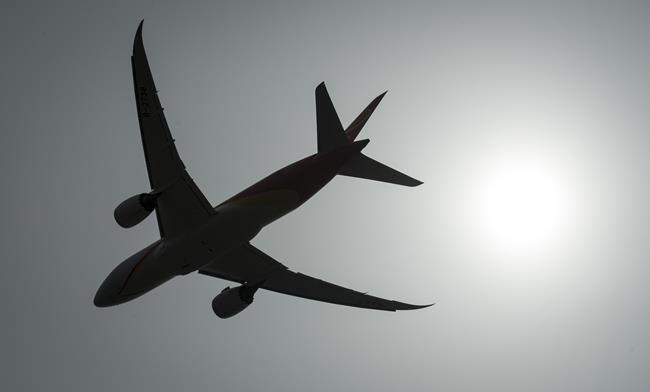
A plane is silhouetted as it takes off from Vancouver International Airport in Richmond, B.C., Monday, May 13, 2019. THE CANADIAN PRESS/Jonathan Hayward
September 08, 2023 - 7:00 AM
Last month, an alarming prospect dawned on Ben Birstonas ahead of a $14,000 all-inclusive getaway planned with his family for Bermuda.
“As we’re approaching the departure date, we hear about hurricane Franklin,” recalled the 58-year-old information technology consultant in a phone interview.
Hurricane Franklin is the tropical storm that bore down on the Caribbean island just days ahead of the family's trip. A few days earlier, it had ripped through the Dominican Republic, causing severe flooding.
The vacation was something Birstonas had promised to his kids as a post-COVID celebration. But as he watched the news roll in, he got increasingly worried.
At 5 a.m. on Aug. 28, the morning of the family’s flight, the U.S. National Hurricane Center issued an advisory that Franklin was the “first major hurricane of the 2023 hurricane season.” It also issued a tropical storm watch for Bermuda specifically as the tempest revved up to a Category 4.
Nonetheless, Birstonas’s insurance required him to cancel three days before the trip in order to claim coverage, airline agents told him.
“How could I have done that?” he asked. “This thing didn’t manifest itself until now.”
Experts said his predicament highlights the need for broad coverage and fine-print checks on travel insurance as Canadians mull their options in the heart of hurricane season — and in a climate of increasingly extreme weather.
Two key forms of travel insurance are trip cancellation and trip interruption coverage.
“Cancellation is virtually everything up to stepping on the plane, and interruption is (when) you're already at your destination and your trip gets interrupted — you can't make it to the next port, you can't get to the next city, you can't leave the country,” said Marty Firestone, president of Toronto-based insurance broker Travel Secure.
Events that can trigger cancellation coverage include long flight delays or cancellations, destinations rendered uninhabitable due to weather or evacuation orders and, crucially, hurricane warnings.
When inclement weather derails a vacation partway through, accommodations and other expenses such as food, rentals and various non-refundable deposits are all reimbursable under trip interruption insurance.
“Fire, heat, floods and also volcanic ash — all of these things can put something in your plans that you either have to stay longer at your destination or you can't get to your destination,” Firestone said.
The price varies widely depending on the value of the trip, but comprehensive travel insurance often ranges from eight to 10 per cent of the cost. “Someone pays $4,000 for a trip, it's going to cost them close to $400 for cancellation and interruption,” Firestone said.
“The longer you're there, the larger your risk exposure,” noted Steven Harris, a licensed insurance broker at LowestRates.ca. That adds to the cost, he said.
Annual insurance plans are also available for more regular travellers, while some family insurance products offer free coverage for dependents, he said.
Other plans include a “cancel for any reason” upgrade — same goes for trip interruption — that allows buyers to abandon their plans for a reason as simple as no longer wanting to go.
Whatever the plan, experts recommend buying earlier rather than later, since the coverage can’t be obtained after the hurricane has reared its head.
They also suggest confirming that any upgraded insurance purchase includes coverage for hurricanes in the first place, as well as other events linked to extreme climate and weather events, if that’s a concern.
“A lot of people planned trips to Hawaii or Maui. In this case, they're out of luck if they don't have insurance,” Firestone said, referring to the wildfires that recently swept through the Pacific island, killing more than 100 people and destroying the historic port town of Lahaina.
“The minute it's known that there's a hurricane heading to that country, the minute you hear about forest fires and that resort is going to be closed down because of air quality, too late.”
The coverage that accompanies some credit cards “is usually much more limited” than separate products, said Sivan Tumarkin, an insurance lawyer at Samfiru Tumarkin.
“The limits could be as little as $1,500 to $5,000, depending on the card you're getting,” added Firestone. A cancelled $20,000 trip would be reimbursed only up to one-quarter of that total, unless the traveller had purchased another product covering the other $15,000.
Allianz, Manulife and Blue Blue Cross all offer travel insurance products, he said.
Medical insurance is a separate concern, one that may demand even more attention to detail.
“If you're travelling while pregnant, usually travel insurance policies won't respond to that situation,” Harris said.
Some more hardcore activities may also be excluded from medical and emergency coverage, such as parasailing, scuba diving and rock climbing, he added.
“Speaking to trip cancellation and interruption ... largely it will boil down to a personal decision, and it will largely be based on your risk tolerance.”
This report by The Canadian Press was first published Sept. 8, 2023.
News from © The Canadian Press, 2023